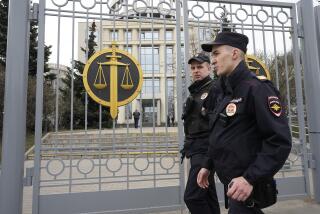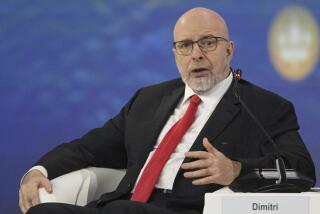Russian tycoon faces new charges
- Share via
MOSCOW — Money laundering and embezzlement charges filed Monday against Russian oil magnate Mikhail Khodorkovsky make it unlikely the prominent political enemy of President Vladimir V. Putin will be released from prison before the 2008 presidential election.
Khodorkovsky’s conviction in 2005 on tax evasion and fraud charges, viewed by many analysts as retribution for supporting political opposition figures, resulted in an eight-year prison sentence. The onetime billionaire and former chief executive of Yukos Oil Co., currently held in Siberia, could have been eligible for parole in October. The new accusations may increase his jail time by up to 15 years.
“It is clear that those who want to keep Khodorkovsky locked up for as long as possible certainly don’t want him to even have a miserable chance” of swaying the presidential election, said Lev Ponomaryov, a leader of the organization For Human Rights, who compared the recent charges to purges by the regime of Josef Stalin.
Ponomaryov added that the Putin administration is “afraid that once out of prison Khodorkovsky may quickly work to unite the liberal opposition and ruin the Kremlin’s plans to dominate the election hands down.”
Khodorkovsky had not been expected to run for office. As a wealthy tycoon, he is not much admired by working Russians. But the prospect of his presence and money in campaigns for parliamentary elections this year and the presidential ballot in 2008 could have inspired activists and funded candidates against politicians backed by Putin, who is in a second term and ineligible for reelection.
The Russian prosecutor general’s office claims Khodorkovsky, once Russia’s richest man, was a consummate schemer who skimmed profits and manipulated privatization programs for personal fortune. He created shell companies and, according to prosecutors, bilked the government out of more than $1 billion in tax revenue. The prosecutor’s office made no public comments Monday, but a statement on its website said Khodorkovsky committed “crimes on a large scale.”
The new charges allege that he and his partner Platon Lebedev laundered more than $20 billion in illegal oil revenue. Once a symbol of Russia’s post-communist capitalism, Yukos is now bankrupt, and its once flashy founder is often pictured peering through prison bars.
“Authorities want to get their hands on the remains of Khodorkovsky’s wealth they believe is stashed away somewhere in the West,” said Stanislav Belkovsky, president of the National Strategy Institute.
“The Kremlin and Putin personally believe that these hidden funds are largely responsible for the growing anti-Putin sentiments in the world.”
Some analysts suggest a conspiracy: The charges are an attempt by the government to divert attention from the recent poisoning death of former secret service agent Alexander Litvinenko and fatal shooting of liberal journalist Anna Politkovskaya. Conservatives and spy networks in the government are perceived by many Russians as having had a role in both.
Whatever the real motives in the Khodorkovsky affair, “Russia stands out to the world as a repressive regime in which Putin’s rule and respect for human rights strongly appear as incompatible notions,” said Mikhail Delyagin, chairman of the Institute for Globalization Studies. “The whole world is invited to witness that the real Putin has nothing to do with his televised image.”
*
More to Read
Sign up for Essential California
The most important California stories and recommendations in your inbox every morning.
You may occasionally receive promotional content from the Los Angeles Times.














